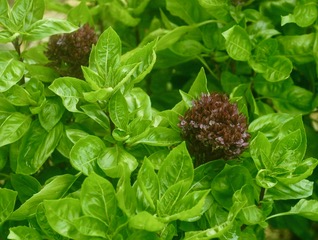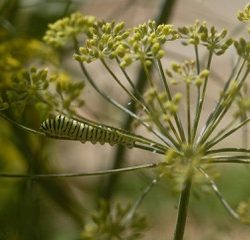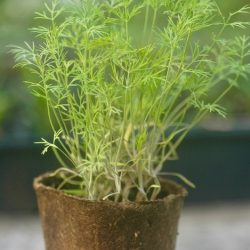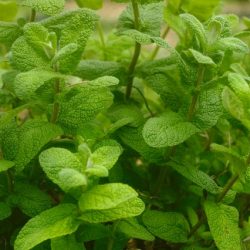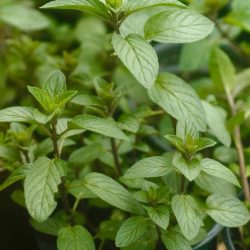Basils
$1.50
in 3″ reused plastic pot
...
Prospera (Genovese-type) – the classic Italian basil, used for making pesto, caprese salad, and bruschetta. Fragrant plants grow 2” tall. Frequent harvesting will promote denser leaf growth and keep the plant from going to seed. Plant in late spring in full sun after the weather has warmed; basil loves warm weather. Annual.
Note: Prospera is a Genovese-type basil that is resistant to basil downy mildew disease. If you’ve had this disease arrive in your basil patch, be sure to plant resistant varieties. In addition, the risk of disease can be reduced by keeping foliage dry, using drip irrigation instead of overhead watering, providing good airflow, and removing and destroying infected plants.
Note: although all basil varieties are susceptible to downy mildew, Genovese is most commonly affected.
Cardinal Basil: Uniquely beautiful Thai basil with large, glossy leaves and dark red flower bracts. Slower growing than other basils; the flower bracts don’t appear until later in summer, but they’re worth the wait! Edible ornamental with cinnamon/clove flavor.
Amethyst Basil: a purple Genovese type basil, very ornamental! Use as garnish and for cooking. Flowers are edible with intense basil flavor.
Dwarf Greek Basil – these cute, compact plants grow only 6-10” tall in a mounded shape, perfect for containers or borders. Spicy-sweet flavor. The tiny leaves make an attractive garnish. Tends to bolt more quickly than regular basil; frequent trimming will keep it from going to seed.
Aromatto: a tall basil ideal, beautiful as filler for bouquets. Purple stems, flower bracts & purple-green foliage. Similar to Cinnamon basil. Sweeter-tasting than Genovese. Flowers are edible with a note of mint, anise, and cinnamon.
Lemon: intense lemon aroma and flavor. Aromatic, bright green foliage grows 2’ tall. Flowers can be used to garnish drinks, salads, soups, pasta and desserts. Use with rice dishes or vegetables, in dressings and marinades, or to give a lemony accent to iced tea.
Holy Basil, Kapoor Tulsi (Ocimum sanctum): many medicinal and culinary uses. Stems, leaves, flowers and seeds are all good for making tea. Harvest frequently for continued production.

